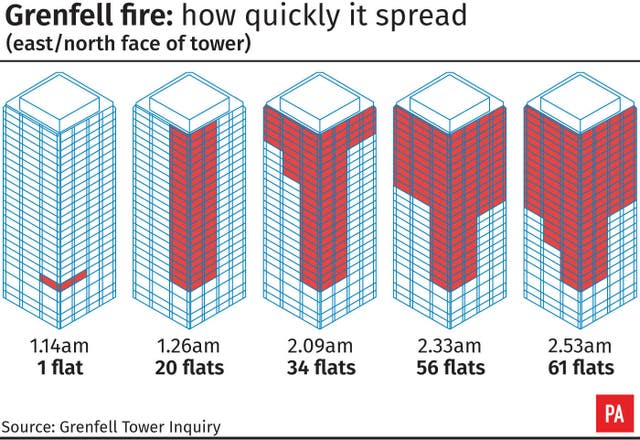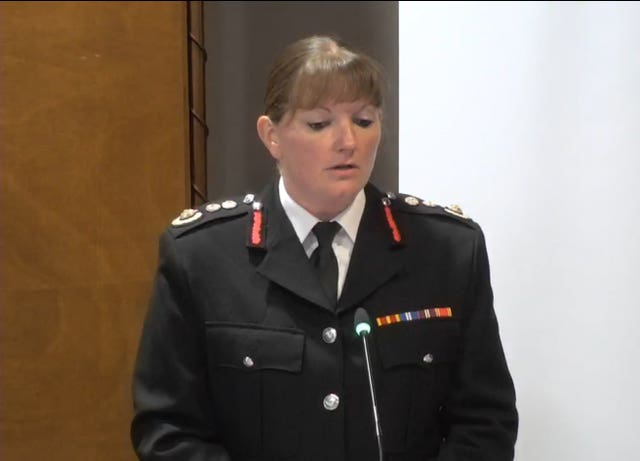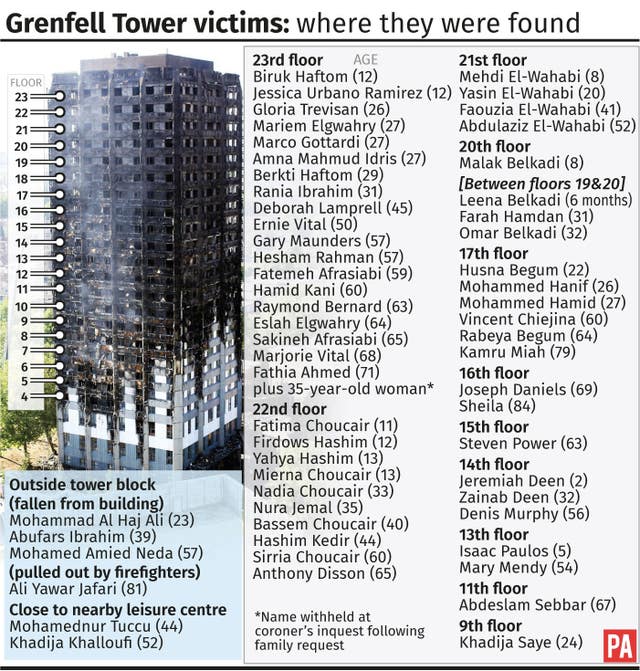The long-awaited first report from the inquiry into the Grenfell Tower fire must find that the high-rise was “non-compliant” with building regulations, survivors and the bereaved have said.
Members of Grenfell United (GU), one of the groups representing those affected by the tragedy, want inquiry chairman Sir Martin Moore-Bick to acknowledge that the 24-storey block failed its residents.
They say he should be able to reach this conclusion, even if he feels the reasons why must be explored in the inquiry’s second phase, which will look into the refurbishment of the building and lead up to the blaze.
The highly-anticipated interim report will examine the night of the fire.

It will be published next week – 28 months after the fire and following a series of delays which have frustrated the local community.
The probe has previously been told by Dr Barbara Lane, an expert witness, that the block was plagued by a “culture of non-compliance” with basic fire safety measures.
Karim Mussilhy, whose uncle Hesham Rahman died in the blaze, said he had very low expectations and that the community’s confidence is “almost non-existent.”
The GU vice chairman told the PA News Agency:
And at the moment we are hoping for the best but expecting the worst.
I hope that it comes out strong but we have to be realistic.
We know that this report is not going to give us justice – it’s too early for that – but it will be a good start, and a good way to set the tone for phase two, and a good way to show that changes can happen now, we don’t need to wait until the end of the inquiry, the end of the investigation, to start making changes. And we can see where changes need to be made.
It is understood the report will run to at least one thousand pages and is expected to painstakingly detail the timeline of events around the night of the fire. Bick-Moore will also make specific recommendations.
Earlier this month, the London Fire Brigade (LFB) published a report detailing what changes it has already implemented since the fire – but Mussilhy dismissed it as a “PR stunt”.
Commissioner Dany Cotton called on the Government to reverse “20 years of neglect” on fire safety and urgently examine “stay put” advice for blazes in high-rise buildings.
Mussilhy added:
We are worried that these (the inquiry’s) recommendations will fall on deaf ears but we’ve had assurances that this isn’t going to be the case.
It’s not about us anymore, we are not fighting for our homes, and we can’t get our loved ones back, we are fighting for the rest of the country because we get scared going to sleep every night thinking or knowing that we might wake up to another Grenfell.

GU chairwoman Natasha Elcock, who escaped the tower block with her family, said it was “absolutely essential” that the “stay-put” policy is reviewed because high-rise residents are not taking it seriously since Grenfell.
She also said anxiety levels are extremely high among the community members she knows because of their high hopes for the report.
Elcock told PA:
This process has already been exceptionally long and there’s been a lot of disregard, from the inquiry and how core participants are engaged, we’ve had to fight pretty much every step … it’s not been an easy ride, so this is the one test now to see whether they do have our best interests or they do want us to be the main focus of this inquiry.
She said it is also crucial that the report acknowledges the innocence of the resident of the fourth floor flat where the fire began, Behailu Kebede, 45.
The inquiry has previously heard that he was offered witness protection, after being subject to a “campaign of harassment”, and should be “explicitly exonerated”.

Seventy-two people died as a result of the fire in June 2017.
On 28 October, the bereaved, survivors and local residents will meet Moore-Bick, when they will be given 48 hours to read the report before it is made public.
But there are no plans for him to take questions from them once they have had a chance to digest his findings, and he is not giving media interviews.
Instead, a short pre-filmed speech from Moore-Bick will air on 30 October, when the report is laid before parliament.
On 1 November, the inquiry team will also publish details on how much the probe has cost so far.
The second phase is due to start in the new year.
But another campaign group, Justice 4 Grenfell, said the inquiry had begun with “Act two, Scene 1” by looking at the night of the fire before the historical context, and that those most accountable were appearing to be let “off the hook”.
A spokesperson said:
The inquiry must fully investigate all such issues, in addition to purely practical issues such as what technically started the fire, how did it spread, the role of the cladding etc.
Those matters are vitally important, but they are simply the final act in a long line of actions that (to us, appear to have) led, inevitably but predictably, to the Grenfell Tower fire and its attendant loss of life.
We submit that, left unchecked, the social forces that have led to Grenfell will inevitably lead to further such preventable disasters.”


















